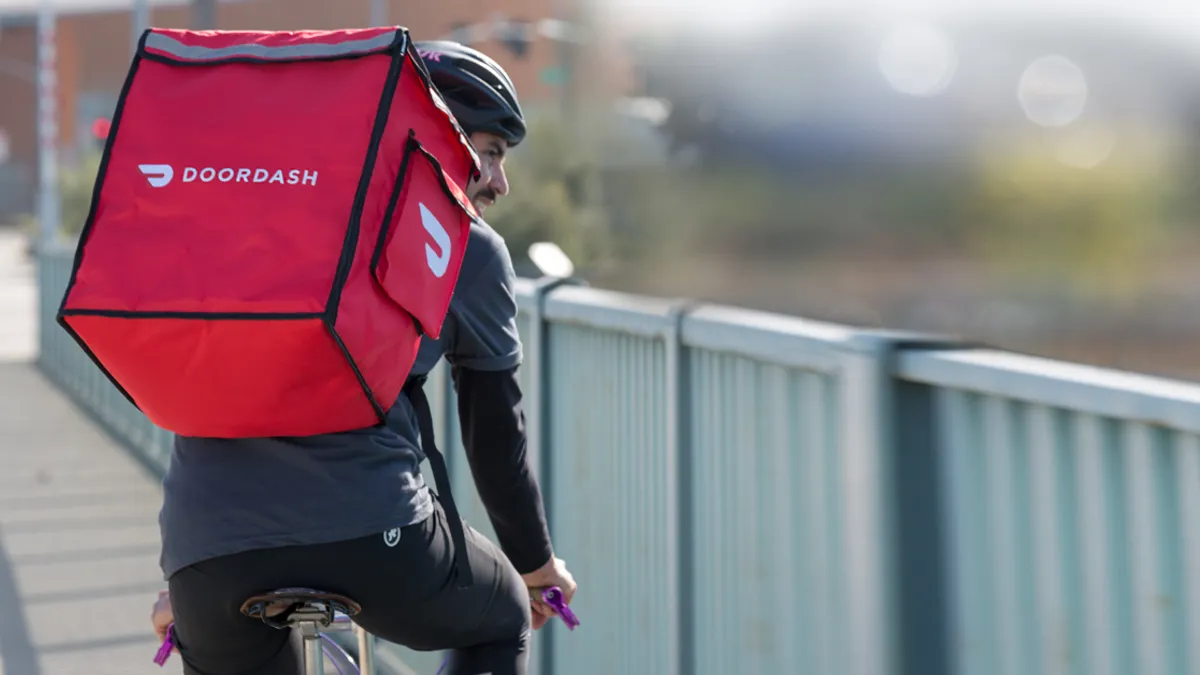Dive Brief:
- DoorDash and Grubhub filed a lawsuit on Friday against the City and County of San Francisco over a permanent delivery fee cap of 15%, which passed in late June. The companies call the cap "unnecessary," "harmful" and "unconstitutional" and are seeking an unspecified amount of monetary damages.
- The lawsuit claims restaurants have a wide range of options for delivery, which includes pricing that is well below 15%, which makes the permanent cap unnecessary. The suit also states the cap will lead to fewer choices for restaurants, higher consumer prices and fewer delivery opportunities for couriers. The companies argue the cap is unconstitutional because "it disrupts contracts between platforms and restaurants, and permanently dictates the economic terms on which a dynamic industry operates."
- The original fee cap, which was passed through an emergency order by Mayor London Breed in April 2020, was set to expire on Aug. 15, which is 60 days after restaurants were allowed to fully reopen in the city.
Dive Insight:
A continuance of fee caps will eventually hit aggregators' bottom lines hard in the long run. By the end of Q4 2020, DoorDash was subject to 73 price controls, compared to 32 at the end of Q3 2020, Prabir Adarkar, DoorDash's CFO, said during the company's Q4 2020 earnings call.
During Q4 2020, price caps impacted the company's revenue by $36 million, which was about 44 basis points on DoorDash's take rate, Adarkar said. The company implemented incremental consumer fees to try and recoup some of the lost revenue, but in the long-term the company's "mantra is to continue reducing consumer fees," he said.
For Grubhub, temporary fee caps resulted in a lower EBITDA per order of $0.52 during Q4 2020, founder and then-CEO Matt Maloney wrote in a letter to shareholders in early February. Without the caps, EBITDA per order would have been $1.50.
While the Board of Supervisors unanimously approved the cap, not everyone agreed with making it permanent. Breed returned the ordinance unsigned to the Board of Supervisors, along with a letter expressing concerns over making the legislation permanent.
"Though I appreciate an intent to continue to protect our small businesses, this ordinance is unnecessarily prescriptive in limiting the business models of the third-party organizations, and oversteps what is necessary for the public good," she said in the letter.
Supervisor Ahsha SafaÍ, who co-sponsored the legislation, told the San Francisco Chronicle that he continues to support the ordinance as it is similar to setting rates on lending practices for banks.
"The days when delivery companies will continue to gouge restaurants are over," he told the publication. Restaurants have also praised the caps, since commissions can range from 15% to 30% per order and cut into revenues.
But the lawsuit argues caps will eventually harm local restaurants since costs to facilitate food delivery not covered by restaurants will likely shift to consumers, which could reduce order volume. In municipalities that enacted temporary caps last year, aggregators added consumer fees ranging from $1.50 to $3, for example.
The lawsuit also claims that the plaintiffs have always worked to create fair contracts. DoorDash introduced a three-tiered commission plan earlier this year while Grubhub's commission structure is negotiable and reflects the marketing and visibility on the marketplace, the lawsuit said.
Maloney, board member of Just Eat Takeaway, said during Just Eat Takeaway's Q2 2021 earnings call with investors that Grubhub is in a marketplace business and it doesn't force anyone to use delivery.
"Most of our restaurants in San Francisco deliver for themselves," Maloney said. "They're simply paying us regeneration fees to get new customers."
He said this ordinance is pretty typical of San Francisco, which is "on the fringe of aggressive new rulemaking, which is generally litigated back."
Other municipalities, including New York City, are also considering permanent caps on delivery, but the results of this lawsuit could dictate whether those caps will be successfully put in place.
"I would predict you do not see another permanent fee cap being voted on till the San Francisco situation gets resolved in court," Maloney said.














